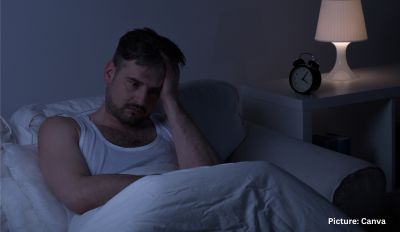Not getting enougha sleep? It could be shortening your life, a new study suggests. According to research from the American College of Cardiology released Thursday, getting the right amount of good sleep each night can play a role in heart and overall health, which could in turn add years to your life. The data also suggests that about 8% of deaths could be attributed to poor sleep patterns.
Dr. Frank Qian, co-author of the study and clinical fellow in medicine at Harvard Medical School, told CBS News that sleep impacts many aspects of health, from hormones and metabolism to mental health and memory. From his and his team’s analysis, he was most surprised with the “potential life expectancy gain… with just fairly simple sleep quality improvements.”
The qualities they identified include:
- Getting 7-8 hours of sleep a night
- Having trouble falling asleep no more than twice a week
- Having trouble staying asleep no more than twice a week
- Not using sleep medications
- Waking up feeling rested at least five days a week
While this may resemble a typical nightly routine for some, for others, especially those who rely on medication for a solid night of sleep, meeting the goals on this list could pose a challenge. According to the Centers for Disease Control and Prevention, more than a third of Americans don’t get enough sleep on a regular basis.
The study found that for those who reported meeting all five of the sleep measures listed, life expectancy was 4.7 years greater for men and 2.4 years greater for women, compared to people who met only one or none of the criteria on the list.
For those getting enough hours of sleep but still not feeling rested, Qian says it could indicate a number of things, including going to sleep distracted, sleeping in a less-than-optimal environment or having untreated sleep apnea, a sleep disorder that causes someone to intermittently stop breathing while asleep.
But he admits no one’s sleep is perfect, and that’s OK — to an extent.
“Certainly all of us… have those nights where we might be staying up late doing something or stressed out about the next day,” Qian explains. “If that’s a fairly limited number of days a week where that’s happening, it seems like that’s OK, but if it’s occurring more frequently then that’s where we run into problems.”
The research was an observational study analyzing data from 172,321 people who participated in the National Health Interview Survey between 2013 and 2018, which is fielded each year by the CDC and the National Center for Health Statistics.
More research is needed to understand the differing results between the sexes as well as what types of sleep aids or medicines are a factor and their impact.
Human brain looks years ‘older’ after just one night without sleep
Going just one night without sleep may make the brain look older, as if it had suddenly aged one to two years overnight, a new study suggests. However, these changes seem to disappear after a good night’s rest.
In the study, researchers used machine learning to generate “brain age” estimates from magnetic resonance imaging (MRI) scans of sleep-deprived people’s brains, which they compared to MRIs of those same people’s brains after a full night’s sleep. The results, published Feb. 20 in the Journal of Neuroscience (opens in new tab), suggest that one night of complete sleep deprivation produces changes in the brain similar to those seen after one or two years of aging.
Brain age is “a very interesting measure in terms of looking at how that changes from the sleep loss,” said Judith Carroll (opens in new tab), an associate professor of psychiatry and biobehavioral sciences at the University of California, Los Angeles who was not involved in the study.
The researchers pulled from five existing data sets, which included data from 134 participants in four groups: total sleep deprivation (no sleep for one night), partial sleep deprivation (three hours time in bed for one night), chronic sleep deprivation (five hours in bed each night for five nights) and a control group (eight hours in bed each night). Each group had at least one night of baseline sleep, where they spent eight hours in bed, before sleep deprivation; most groups also had a full night of recovery sleep afterwards.
Everyone had an MRI taken after each night, allowing researchers to compare how their brains looked before and after sleep deprivation, and after a full night’s rest.
The researchers determined the apparent ages of the participants’ brains using a machine-learning algorithm called brainageR, which was trained on data from more than 3,000 people. The publicly available algorithm predicts a person’s chronological age from their brain MRIs based on how healthy brains typically look at given ages, in terms of their tissue and fluid volume. In past tests, researchers found that brainageR could accurately predict age within about four years.
In their new study, the researchers found that, for the group that got no sleep for one night, brainageR estimated that they were one to two years older, on average, than they were predicted to be at baseline. These differences vanished after a night of recovery sleep.
The partial and chronic sleep deprivation groups didn’t have significant differences in their age predictions, compared to control.
These results jibe with earlier research on the effect of sleep deprivation on the brain. There’s evidence that several types of changes take place in the brains of sleep-deprived people, including changes in fluid distribution and gray matter volume.
This “widespread change in brain morphology … would be captured with this method of brain age as well,” study senior author Dr. David Elmenhorst (opens in new tab), a professor in the Institute of Neuroscience and Medicine at the research institution Forschungszentrum Jülich in Germany, told Live Science. Crucially, he framed the results not as actual aging but rather as changes that the machine-learning algorithm interpreted as aging.
Because the study found this effect only in the total sleep deprivation group, it’s hard to say what the results might mean for the effects of sleep deprivation in real life, Carroll said. “I’m not sure that we can say anything about long-term effects of chronic sleep loss, because even the chronic condition’s only five days,” she said.
The study was also relatively small. Elmenhorst said a larger sample size might highlight smaller effects in the other groups, like a brain age increase of a few months. Future research could also incorporate people who experience chronic sleep deprivation, such as people who do shift work, Carroll said.
“A lot of individuals really struggle to sleep [during the day] when they’re awake all night,” she said. “Something that looks more closely at this in those groups, I think could be really valuable and more informative.”











